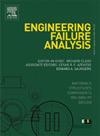3D GPU-accelerated FDEM for fracturing and stability analysis of jointed rock masses due to tunnel excavation
IF 4.4
2区 工程技术
Q1 ENGINEERING, MECHANICAL
引用次数: 0
Abstract
The fracturing and instability of jointed rock masses during tunnel excavation is a complex process involving crack initiation, propagation, and intersection, as well as block spalling, overturning, and extrusion, which poses significant challenges to traditional continuous or discontinuous methods. Leveraging the hybrid Finite-Discrete Element Method (FDEM) and CUDA C/C++ programming model, this study develops a Ytunnel module within the 3D GPU-accelerated FDEM framework. The Ytunnel module incorporates approaches for in-situ stress generation, quasi-static excavation, and detailed rock joint characterization. The effectiveness of the developed method is first validated through two numerical examples: a homogeneous stratum excavation, which demonstrates close alignment with theoretical predictions of stress evolution, and a simulation of the classic URL test tunnel, which accurately captures field-observed damage zone. The failure process of surrounding rock in jointed rock masses caused by tunnel excavation is also investigated. The results reveal that the presence of joints plays a critical role in the fracturing and instability of surrounding rock. The 3D GPU-accelerated FDEM integrated with the Ytunnel module offers a powerful and versatile approach for investigating the complex behaviors of rock masses induced by tunnel excavation.
求助全文
约1分钟内获得全文
求助全文
来源期刊

Engineering Failure Analysis
工程技术-材料科学:表征与测试
CiteScore
7.70
自引率
20.00%
发文量
956
审稿时长
47 days
期刊介绍:
Engineering Failure Analysis publishes research papers describing the analysis of engineering failures and related studies.
Papers relating to the structure, properties and behaviour of engineering materials are encouraged, particularly those which also involve the detailed application of materials parameters to problems in engineering structures, components and design. In addition to the area of materials engineering, the interacting fields of mechanical, manufacturing, aeronautical, civil, chemical, corrosion and design engineering are considered relevant. Activity should be directed at analysing engineering failures and carrying out research to help reduce the incidences of failures and to extend the operating horizons of engineering materials.
Emphasis is placed on the mechanical properties of materials and their behaviour when influenced by structure, process and environment. Metallic, polymeric, ceramic and natural materials are all included and the application of these materials to real engineering situations should be emphasised. The use of a case-study based approach is also encouraged.
Engineering Failure Analysis provides essential reference material and critical feedback into the design process thereby contributing to the prevention of engineering failures in the future. All submissions will be subject to peer review from leading experts in the field.
 求助内容:
求助内容: 应助结果提醒方式:
应助结果提醒方式:


